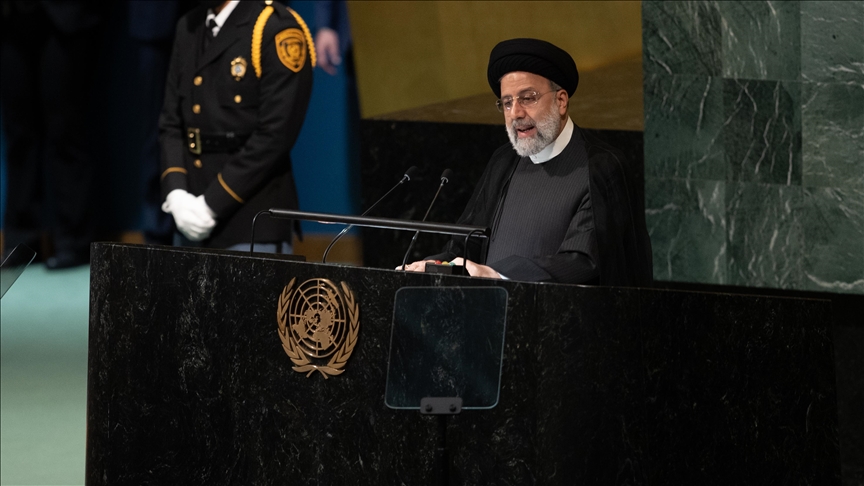Iran’s Raisi accuses West of ‘double standards’ on human rights
Iran’s president makes first appearance at UN General Assembly since taking office last year
 Iranian President Ebrahim Raisi speaks at the 77th session of the United Nations General Assembly (UNGA) at U.N. headquarters on September 21, 2022 in New York City, United States.
Iranian President Ebrahim Raisi speaks at the 77th session of the United Nations General Assembly (UNGA) at U.N. headquarters on September 21, 2022 in New York City, United States.
TEHRAN, Iran
In his first-ever appearance at the UN General Assembly on Wednesday, Iran’s President Ebrahim Raisi accused the West of adopting “double standards” on human rights and justice.
He said Iran bats for the “globalization of justice” while referring to the recent incident of an Iranian woman whose death in police custody has sparked countrywide protests.
Raisi said double standards exhibited by some Western governments have fueled human rights violations, pointing to the widespread coverage of the incident related to the 22-year-old woman’s death and what he called “deathly silence” of the death of homeless women in the West.
Raisi’s trip to New York to take part in the 77th session of the UN General Assembly has coincided with angry protests across Iran over the death of Mahsa Amini, 22, who died in police custody on Friday after being detained over an alleged violation of the Islamic dress code.
Raisi has asked the interior ministry to investigate the death as protests continue to grow louder.
The incident has drawn condemnation from many world leaders and human rights groups, including the United States, to which Iran’s foreign minister on Tuesday took strong umbrage.
Rights violations
In his UNGA speech, Raisi slammed Western countries for what he termed “violations of human rights and the rights of nations,” including those of the indigenous people of Canada.
He said the world has stayed silent on the "killing of tens of defenseless women" in a Western country, without naming it, while also criticizing Canada for the treatment of its indigenous population.
The Iranian president referred to the “change in world order” where international organizations have become “instruments of repression”, saying this order has lost support among people.
He said his country has faced “coups, foreign interventions, and coercive sanctions” over the decades, while also referring to foreign interventions in countries such as Afghanistan and Iraq.
Raisi further said that dialogue, not war, is a solution, hastening to add that Iran as an important regional player is ready to help solve regional crises through dialogue.
He said he had told his counterparts from regional countries on the margins of the UNGA summit in New York that the security of the region must be secured by the regional countries themselves.
Iran’s president went on to accuse the US of “creating” the Daesh/ISIS terrorist group, saying former US President Donald Trump had “admitted to it”.
He held aloft a picture of slain military commander Gen. Qassem Soleimani during the speech, saying his country will pursue the “trial of the former US president’s crime through a fair tribunal”.
Soleimani was assassinated outside the Baghdad airport in January 2020 in a US airstrike. Iranian leaders have often spoken about avenging his death.
Nuclear deal
On Iran’s nuclear program, Raisi said the country is not after developing nuclear weapons, invoking the religious decree issued by Iran’s Supreme Leader Ayatollah Ali Khamenei.
He said only 2% of nuclear activities in the world take place in Iran, while 35% of inspections of the UN nuclear watchdog are focused on the country.
Raisi described sanctions as “weapons of mass destruction”, blaming the US for “trampling” the nuclear agreement reached in 2015 and procrastinating on its revival.
The indirect talks between Tehran and Washington to revive the nuclear deal, from which the US withdrew in May 2018, have been underway in the Austrian capital since April last year.
While both sides have noted progress in recent rounds of talks, mediated by the European Union, some key sticking points, including a probe into undeclared nuclear sites in Iran, have prevented a breakthrough.
Raisi, putting up a tough front, said Tehran has “found a path independent of any agreement”, an indication that the revival of the deal is not on top of his government’s agenda.
Before departing for New York on Monday, the Iranian leader had ruled out the possibility of meeting US officials on the sidelines of the summit to end the nuclear deal deadlock.
In an interview with CBS News’ 60 Minutes on Sunday, he said Biden was following Trump’s roadmap, stressing that his meeting with Biden will be “futile”.
In the last two days in New York, Raisi held a series of meetings with the leaders of France, Iraq, Pakistan and Switzerland, and the European Union Commission president.
Raisi told his French counterpart Emmanuel Macron that an agreement was impossible without Iran’s case at the UN nuclear agency being closed. Macron, however, refused to put pressure on the watchdog, urging Iran and the IAEA to resolve the issue through cooperation.
Iran’s top nuclear negotiator Ali Bagheri, who is accompanying Raisi on the trip, also held a meeting with EU Deputy Foreign Policy chief Enrique Mora on the sidelines of the summit on Tuesday.
Anadolu Agency website contains only a portion of the news stories offered to subscribers in the AA News Broadcasting System (HAS), and in summarized form. Please contact us for subscription options.







